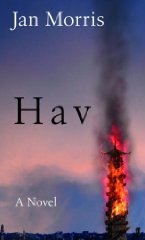Hav Not
by Jan Morris
One of the joys of Jan Morris's Last Letters from Hav is its wonderful faux scholarship. Morris hasn’t merely written a guide to the tourist pleasures of Hav; she has read and weighed the literary and historical authorities, ancient and modern, and she lays these out for our guidance and instruction. On the Havian landmark of “The House of the Chinese Master”, built in 1432, she offers admiring and insightful quotations from Pero Tafur, Alexander Kinglake, Mark Twain, and D. H. Lawrence. She notes that Robert Domett, the subject of Browning’s “What’s become of Waring/Since he gave us all the slip?” (which is a genuine Browning poem) dwelt in Hav for a time and met Kinglake there in 1834, where Kinglake found him unchanged in spirit, “only tutrned a chestnutty hue”. We have anecdotes of Cavafy and Hemingway. We have old Punch limericks about Sir Joshua Remington’s appointment to the Redisdency of Hav. We meet an man of letters named Dr. Borge.
Kinglake wrote a travel book named Eothen, published in 1844. Who knew? There's a national park outside Melbourne that is, I believe, named for him. I think Professor Miles took me there to see the bowerbird, who was not at home.
Hav is, quintessentially, an Eastern European melting pot, a place where civic ceremonies require the presence of three bishops (Roman, Orthodox, Maronite) and a would-be Caliph along with heads of Chinese, Armenian, and aboriginal communities. She takes great joy in exploring the relics of its history, the traces of Hav under the Venetian doges, Ottoman Hav, of Hav under the Russians, of Hav’s administration under a tripartite commission of the League of Nations, of modern independent Hav with its quaint customs and minute territory.
But this is 1985, the year after the Sarajevo Winter Olympics. By 1992, Sarajevo would be under siege, and Morris shows no more awareness of the tensions and ancient hatreds of the region than had the cheerful NBC Olympic announcers. Her allusions to WWII are ambiguous rumors of espionage and diplomacy. But Hav seems to have no ghetto, no Jewish quarter, and while she hunts down the old Anglican cathedral (now converted to a warehouse) she never inquires about the synagogue. Her history seems to be cleaned up and cheered up, accepting that “we’re all friends ’round here” when, very soon, we’d all be at war.
War does come to Hav at the end of Last Letters, but the shadow is the wrong shadow, the shadow of 9/11, and the Mymyridon state is more a banal and benign Security State than the ethnic maelstrom of Kosovo or Baghdad. We used to say the 9/11 changed everything, but history plays us like the oracle played Croesus: perhaps in a few years we’ll see that what 9/11 changed was the American illusion that conservatism would return us to a past that never was. It’s not all about us: the people in Hav have troubles (as who does not?) and their troubles are not always our own.
